
Best appointment scheduling software for small organizations
Your email has been sent
Choosing appointment scheduling software is easy if you know how to weigh the options. This article will help you make the right choice.
Appointment scheduling software for small businesses has become increasingly necessary in recent years, and it’s easy to understand why. These programs allow small business owners to focus their time and energy on what matters most: growing and managing their businesses. Appointment-setting software does this by automating many of the tasks associated with managing appointments, such as sending reminders and notifications, tracking availability, booking events, and syncing schedules across different platforms.
SEE: Hiring kit: Technical recruiter (TechRepublic Premium)
In this in-depth guide, compare some of the top business appointment scheduling software solutions on the market and learn more about the features and benefits that come with investing in this type of small business technology.
Jump to:
Calendly
Available for individuals, teams, small and midsize businesses, and even enterprise organizations, Calendly boasts an intuitive interface, rapid adoption, fast and frictionless customer interactions, high levels of customer end-user satisfaction, and important security safeguards.
In addition, the software works with popular web browsers, features a stand-alone mobile app, integrates with customer relationship management systems, and connects to the PayPal and Stripe payment platforms.
Figure A
Calendly offers a free Basic version of its software with no time limit, while a free 14-day trial is available for its Teams plan. An Essentials subscription runs $8 per seat per month, the Professional plan is $12 per seat per month and the Teams offering costs $16 per seat per month. Those prices are for annual billing plans; slightly more expensive monthly options are available as well.
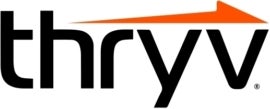
Touting a dedicated focus on small businesses, Thryv isn’t simply an appointment scheduling tool. It also offers a suite of complementary solutions for small business owners that include CRM, customer communication, reputation management, payment processing, marketing, document sharing and storage solutions. Thryv seeks to provide a complete small business management platform using a single online dashboard.
The company’s appointment scheduling software permits customers to reserve their own meetings and appointments and synchronizes with the business’s calendar software to prevent overbooking.
Figure B
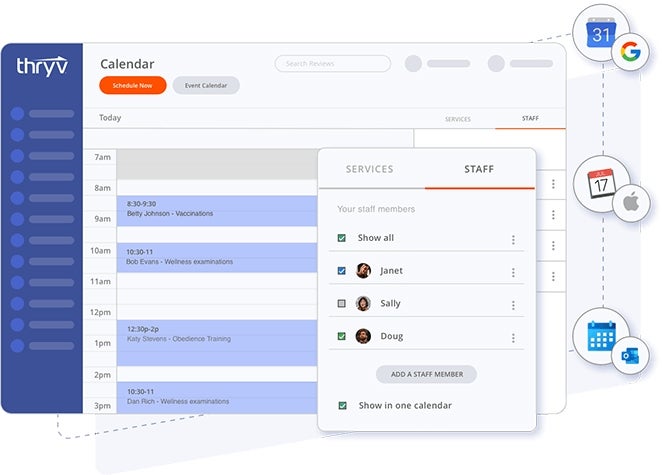
Thryv offers three subscription options: Plus, Premium and Unlimited. The Plus version supports two users and provides scheduling and appointment services; text and email features; 20GB of document storage; and payment processing using Braintree, Square, Stripe or PayPal. Exact pricing information is available upon request from the Thryv sales team.

Squarespace, known for simplifying SMB website design and e-commerce administration, also offers an all-in-one Squarespace Scheduling appointment management solution. Customers need not possess a Squarespace website to use the company’s appointment scheduling service; any web-hosting service will work. All Squarespace Scheduling plans offer calendar syncing, custom payment options, invoicing and automatic reminder email messaging.
A similar service, Acuity Scheduling, was acquired by Squarespace in 2019. The two share almost all of their features. However, Squarespace Scheduling is natively offered for existing Squarespace users and accounts.
Figure C
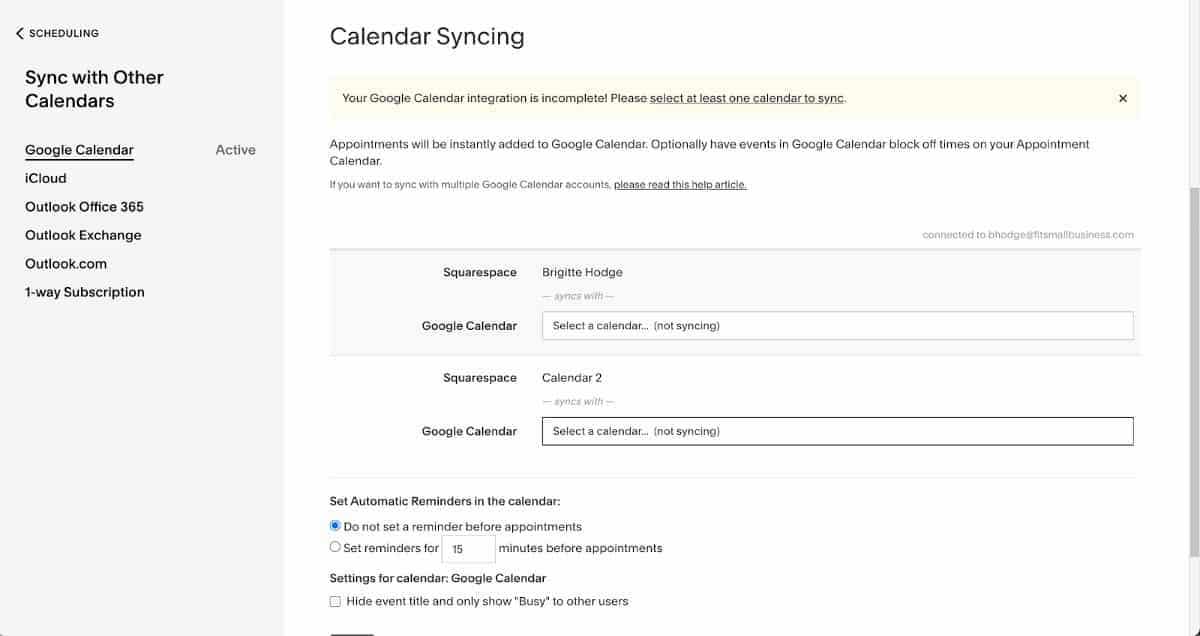
Three Squarespace Scheduling plans are available. Billed annually, the Emerging plan is $14 per month, the Growing plan runs $23 per month and the Powerhouse plan costs $45 per month.

One vendor that is familiar to several SMBs is Square, which gives many businesses the ability to start accepting credit cards. The company’s Square Appointments software integrates with its point-of-sale system to concentrate scheduling, point-of-sale features and payment processing all within a single platform.
Figure D
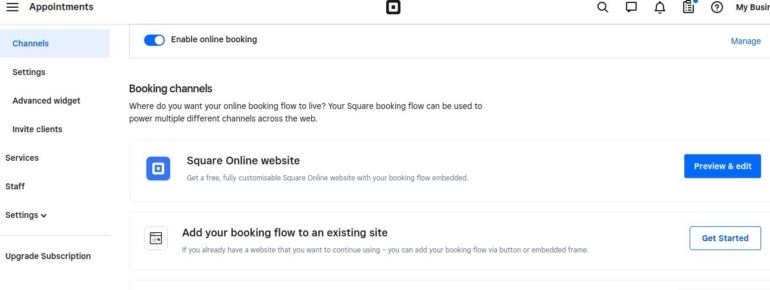
Three subscription plans are available: Free, Plus and Premium. The Free version is for use at a single location and includes an unlimited number of user accounts, access to the custom booking website and social media integrations, integrated payments, automated text and email reminders, and appointment and sales history tracking. The Plus version, at $29 per month per location, adds multiple time zone and location supports and lowers the in-person credit card transaction fee by 10.1%. Premium is $69 per month per location and adds custom permissions, multiple wage rates, and team sales and labor reporting capabilities.

Advertising itself as “free scheduling software,” Setmore offers its clients’ customers around-the-clock automated online scheduling. The solution also offers SMBs a wealth of other features for managing appointment workflows. Free trials for Setmore are available, and the company also offers 30-day money-back guarantees.
Figure E
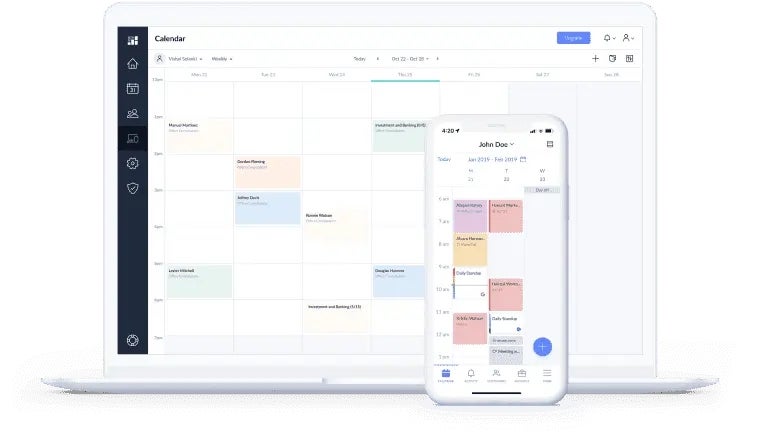
Three pricing plans are available, with the first being free and supporting up to four users. The free version provides businesses with unlimited appointments, social media integrations, email reminders, Square payment processing, Teleport video meetings and a custom booking webpage. The Premium plan runs $5 per user per month billed annually and supports two users. The Pro plan, which supports three or more users, is $5 per user per month when billed annually.

An unusual approach, one company offers two separate but similar scheduling solutions: SimplyBook.me and SimplyMeet.me. The SimplyBook.me LTD company, a global ISO 27001 certified firm, first launched its appointment scheduling software in 2009. When the company acquired the Harmonizely CalDAV scheduling tool in June 2021, it rebranded that technology as SimplyMeet.me. The firm offers both solutions today. If SimplyBook.me proves too extensive for a business’s needs, SimplyMeet.me offers a simplified interface with fewer features.
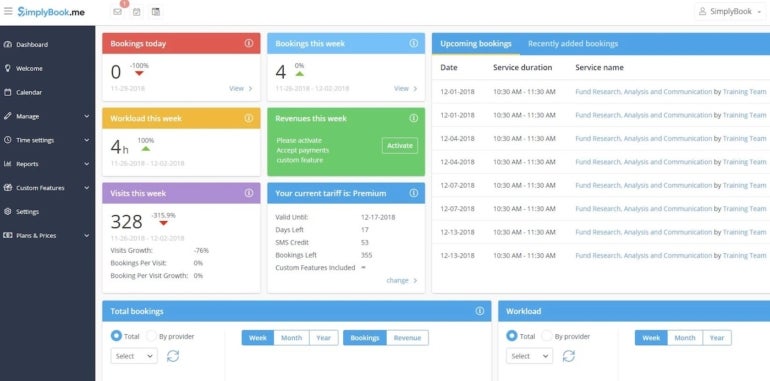
SimplyBook.me offers a free 14-day trial that includes most features and up to 50 bookings. Five subscription types are available:
SimplyMeet.me, meanwhile, offers simplified services, albeit via three different pricing plans:
In today’s fast-paced world, it’s more important than ever for small businesses to provide their customers with convenient, self-service appointment scheduling options. Appointment scheduling software permits customers to review a business’s availability and independently book appointments and meetings using an online interface or email. Such apps allow customers to reserve, change and cancel appointments and meetings without needing to call or communicate with the business directly.
SEE: Calendly vs. Acuity: Appointment scheduling software comparison (TechRepublic)
Not only does this free up valuable time for small business owners and their staff, but it also provides a better customer experience by allowing customers to schedule appointments according to their own schedules and timelines. In addition, appointment scheduling software often comes equipped with valuable features like online payment processing, automatic reminders and customer management tools.
Depending on the platform and selected features, appointment scheduling applications can integrate with a small or midsize business’s website and software systems — including email, calendars, customer relationship management and payment systems — to better enhance workflows. Workflows that are often improved by appointment scheduling software include appointment booking, customer follow-up messaging, and requesting and receiving payments.
SEE: Vendor access policy (TechRepublic Premium)
Business owners and managers can share their business’s calendaring and appointment-booking systems with the appointment scheduling software. Customers, subsequently, can access the information in real time and use their own devices to find or reschedule an appointment that also works with the business’s schedule.
At the very minimum, appointment scheduling software should have the following features:
One of the most important features of appointment scheduling software is its ability to sync with calendar software. This is important because it allows business owners to see their appointments in one central location — their calendar — along with any other meetings or appointments they might have. This can prevent double-booking and other schedule conflicts.
Another key feature of appointment scheduling software is the ability to generate a shareable link to a user’s booking page. This link can be shared via email, social media or a website. It makes it easy for potential customers to book an appointment without having to go through the hassle of filling out lengthy forms.
In addition to generating a shareable link, many appointment scheduling software platforms also allow users to embed their booking page into their website. This is a great option for businesses that want to make booking an appointment as easy as possible for their customers.
Finally, most appointment scheduling software platforms enable users to set custom working hours or availability windows. This is important because it allows businesses to only offer appointments when they are available. For example, if a business only offers appointments from 9 a.m. to 5 p.m., Monday through Friday, then they can set their availability window accordingly, so potential customers can only book appointments during those times.
Appointment scheduling software improves customer service in several ways. First, it ensures customers can easily book appointments online, 24/7. This eliminates the need for customers to call during business hours and wait on hold until they can speak to someone.
Second, it allows businesses to send automatic appointment reminders to customers before their appointments. This reduces no-shows, which is often a major issue for businesses that rely on appointments.
Appointment scheduling software can also help businesses keep track of customer information and preferences, which can be used to provide a better customer experience.
Another benefit of appointment scheduling software is increased efficiency. When businesses use appointment scheduling software, they no longer have to spend time managing appointment bookings manually. This frees up time for employees to focus on other tasks, such as serving customers and growing the business.
SEE: How to use Google Calendar appointment schedules (TechRepublic)
Appointment scheduling software can also automate many tasks associated with managing appointments, such as sending reminders and confirming appointments. This further increases efficiency by eliminating the need for employees to do these tasks manually.
Appointment scheduling software can improve profitability by reducing operating costs and increasing revenue. When businesses use appointment scheduling software, they often find that they need fewer staff members to manage appointments effectively. This reduces labor costs and helps improve bottom-line profits.
SEE: Hiring kit: Automation specialist (TechRepublic Premium)
In addition, by automating many of the tasks associated with managing appointments, businesses can free up time that can be used to generate new leads and close new sales. This helps increase top-line revenue and further improves profitability.
Appointment scheduling software has been known to help business users better manage their time. With a system in place, users will be able to see exactly how much time they have available for each appointment.
This information can help users better plan their day, so they can make the most of their time. Additionally, users will be able to avoid overbooking or double-booking appointments, which can lead to wasted time and lost revenue.
Another advantage of using an online booking system is that it offers businesses much greater flexibility than traditional methods of booking appointments, such as by phone or in person.
Online booking systems allow businesses to offer their customers a range of options for booking appointments by date, time or location. This flexibility means businesses can cater to their customers’ needs much more effectively than before.
Finally, one further benefit businesses enjoy when using online booking systems is increased exposure. By making it easy for customers to book appointments online, companies are opening up their services to a much wider audience than before. This exposure can help to boost sales and spread awareness about the company’s products and services.
Read next: Best employee monitoring software (TechRepublic)
We deliver the top business tech news stories about the companies, the people, and the products revolutionizing the planet.
Best appointment scheduling software for small organizations
Your email has been sent
Your message has been sent
TechRepublic Premium content helps you solve your toughest IT issues and jump-start your career or next project.
Looking for the best payroll software for your small business? Check out our top picks for 2022 and read our in-depth analysis.
Next year, cybercriminals will be as busy as ever. Are IT departments ready?
The company, which for several years has been on a buying spree for best-of-breed products, is integrating platforms to generate synergies for speed, insights and collaboration.
Organize a number of different applicants using an ATS to cut down on the amount of unnecessary time spent finding the right candidate.
Whether you are a Microsoft Excel beginner or an advanced user, you’ll benefit from these step-by-step tutorials.
Video games can benefit companies by giving employees a recreational outlet to build cooperation and morale. But they can also create problems if misused. This policy will help you establish the ground rules for permitting or prohibiting the use of company systems and networks for video gaming purposes. Where gaming is allowed Video gaming is …
A platform developer, someone intimately familiar with specific operating systems and hardware components, works on a company’s core platform to create and optimize all the various functions needed to establish a strong computer infrastructure. The platform developer needs to be a big picture thinker and always keeping in mind why they’re building something and who …
Virtual reality and augmented reality are concepts which have attracted plenty of interest in both consumer and business operations. Both have shown incredible potential and versatility across a wide range of applications. AR can be used as an “overlay” concept to link real-world environments to technology, such as for identifying individuals, providing GPS data or …
AlmaLinux is well on its way to becoming one of the most popular drop-in replacements for CentOS/RHEL. Anyone who has used CentOS will immediately be familiar with the operating system. Any admin who’s not used CentOS will find it as solid a platform as any other for enterprise-level computing. Although the installation of AlmaLinux is …




